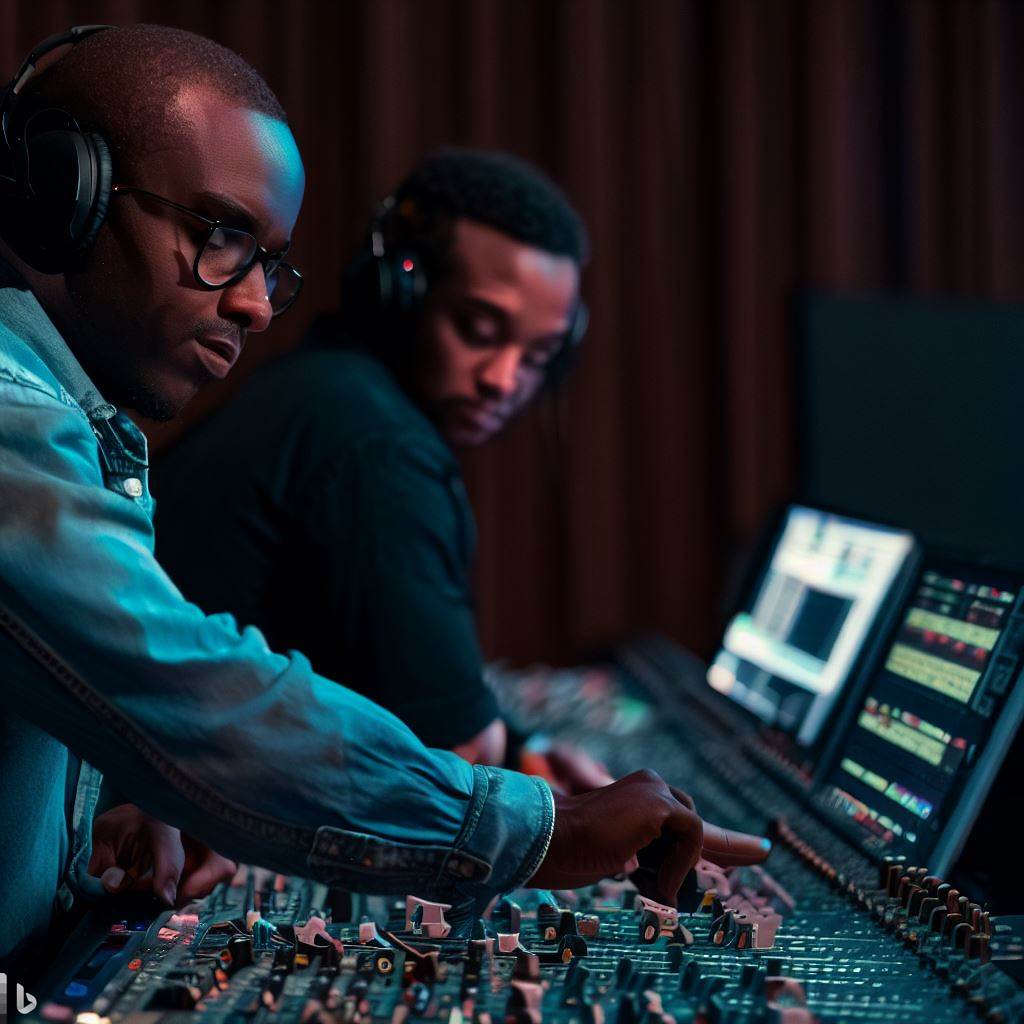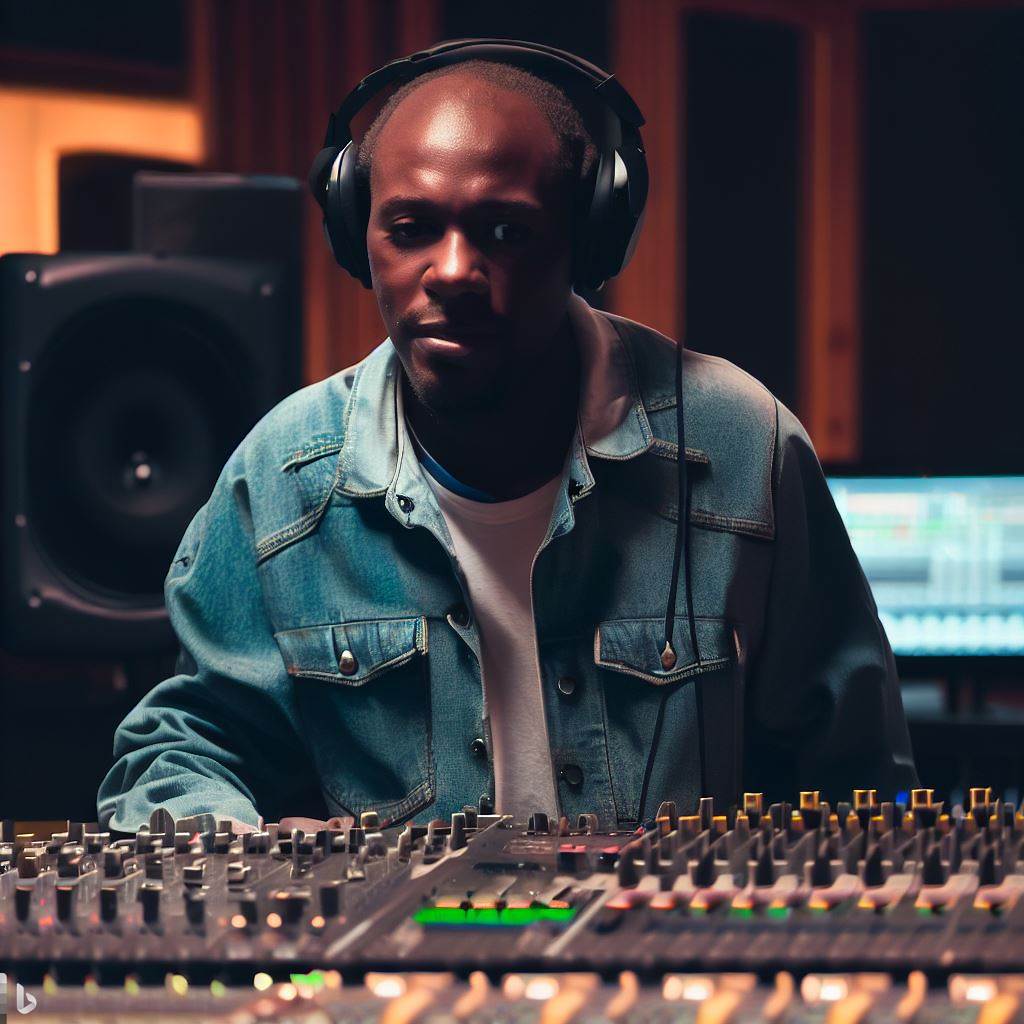Introduction
In Nigerian music industry, a mixing engineer plays a crucial role in ensuring the quality and balance of sound in a song or album.
They enhance the music by adjusting levels, adding effects, and creating a cohesive sound.
The Nigerian music industry is a vibrant and dynamic sector, known for its diverse genres and talented artists. It has grown significantly over the years, becoming a major player in the global music market.
A good mixing engineer has a keen ear for detail and technical knowledge of various audio equipment and software.
They work closely with artists and producers to bring their vision to life, ensuring that every instrument and vocal is heard clearly and harmoniously.
The importance of a mixing engineer in the Nigerian music industry cannot be understated. They are the bridge that connects the artist’s creativity with the final product that reaches the audience.
Without their expertise, a song may lack clarity, coherence, and impact. Moreover, a skilled mixing engineer can elevate a song to new heights, making it more marketable and appealing to a wider audience.
They know how to balance different elements, enhance the sonic quality, and create a polished sound that stands out in a crowded music industry.
In the end, the Nigerian music industry thrives due to the contributions of talented mixing engineers. They play a vital role in shaping the industry’s sound and ensuring a high standard of production.
Without them, the music experience would not be the same.
What is a Mixing Engineer?
Definition and role in music production
A mixing engineer is a vital player in the music production process, responsible for ensuring sonic balance and clarity in a song.
They are the ones who take all the individual tracks recorded during the production phase and blend them together into a cohesive and polished final product.
The role of a mixing engineer is to enhance the quality of the music by adjusting various elements such as volume levels, panning, equalization, and effects.
They have a deep understanding of audio engineering techniques and technology, allowing them to bring out the best in a recording.
Responsibilities and tasks in the Nigerian music industry
1. Balancing the audio elements
One of the primary tasks of a mixing engineer in the Nigerian music industry is to balance the different audio elements, ensuring that each instrument and vocal is audible and occupies the appropriate space in the mix.
This is crucial to maintain clarity and prevent any particular element from overpowering others.
2. Improving the overall sound quality
Nigerian music is known for its vibrant and energetic sound. A mixing engineer adds the necessary polish and finesse to the recordings, bringing out the nuances and making the music sound professional.
They use techniques like equalization, compression, and reverb to shape the sound and make it appealing to the ears.
3. Enhancing the impact
Nigerian music is all about creating a powerful impact on the listeners. A skilled mixing engineer knows how to add depth, width, and dimension to the mix, making it sound immersive and captivating.
They use stereo imaging and spatial effects to create a sense of space, making the listeners feel like they are surrounded by the music.
4. Collaboration with artists and producer
A mixing engineer works closely with artists and producers to understand their vision for the music.
They take feedback and make adjustments to the mix accordingly, ensuring that the final product aligns with the artist’s creative intentions.
This collaboration is crucial for achieving the desired sonic outcome and meeting the expectations of the Nigerian music industry.
5. Technical expertise
In addition to artistic skills, a mixing engineer in the Nigerian music industry needs to have a deep understanding of technical aspects.
They should be proficient with digital audio workstations (DAWs), plugins, and hardware equipment to effectively manipulate the audio and achieve the desired results.
6. Keeping up with trends and innovation
The Nigerian music industry is dynamic and ever-evolving. A good mixing engineer stays updated with the latest trends and innovations in audio production.
They explore new techniques, plugins, and equipment to bring fresh sounds and keep the music relevant and competitive in the industry.
7. Delivery of the final mix
Once the mixing process is complete, the engineer is responsible for delivering the final mix in a format suitable for distribution and release.
They ensure that the mix meets industry standards and translates well across different playback systems, such as speakers, headphones, and car stereos.
In fact, a mixing engineer plays a crucial role in the Nigerian music industry.
They are responsible for bringing out the best in a recording, balancing the audio elements, enhancing the sound quality, and creating a powerful impact.
With their technical expertise and artistic skills, they contribute significantly to the success and appeal of Nigerian music.
Read: Salary Expectations: What Does a Mixing Engineer Earn in Nigeria?
Skills and Expertise of a Mixing Engineer
Technical knowledge of audio equipment and software
- A deep understanding of different types of audio equipment such as mixing consoles, microphones, and amplifiers.
- Proficiency in using various software programs and digital audio workstations (DAWs) for audio mixing.
- Knowledge of signal flow and routing in order to properly connect and use audio equipment.
- Ability to troubleshoot technical issues and resolve any problems that may arise during a mixing session.
- Stay updated with the latest advancements in audio technology and equipment.
Understanding of different music genres and styles
- Familiarity with a wide range of music genres, including popular Nigerian music genres such as Afrobeat, highlife, and juju.
- Ability to identify and appreciate the unique characteristics and elements of different music genres and styles.
- Understanding how specific mixing techniques and approaches can enhance and complement different genres.
- Adaptability to cater to the specific needs and preferences of artists from different musical backgrounds.
- Keep up with the evolving trends and developments in the Nigerian music industry.
Ability to balance audio levels and sound dynamics
- Skilled in achieving a balanced mix by adjusting the levels of individual audio tracks.
- Knowledge of dynamic range and techniques to control sound dynamics, such as compression and limiting.
- Ability to create a clear and coherent sonic image where each instrument and element can be heard and appreciated.
- Expertise in using panning and stereo imaging to create a spacious and immersive soundstage.
- Understanding the importance of creating a balanced mix that translates well to different listening environments and systems.
Knowledge of audio effects and processing techniques
- Familiarity with a variety of audio effects such as reverb, delay, chorus, and EQ.
- Understanding how different effects can enhance or alter the sound of individual tracks and the overall mix.
- Knowledge of advanced processing techniques like parallel compression and sidechain processing.
- Ability to use automation to modulate and control the parameters of audio effects.
- Experimentation and creativity in applying effects to achieve the desired sonic results and atmosphere.
A skilled mixing engineer possesses technical expertise, a profound understanding of various music genres, the ability to balance audio levels and sound dynamics, and knowledge of audio effects and processing techniques.
By combining these skills, they can elevate a song to its highest potential and make it shine.
Read: Networking for Success in Nigeria’s Voice Acting Industry
Importance of a Mixing Engineer in the Nigerian Music Industry
Enhancing the overall sound quality of a track or album
- A skilled mixing engineer plays a crucial role in improving the overall sound quality of a track or album.
- They have the expertise to enhance the clarity, depth, and richness of the audio through various techniques.
- With their technical knowledge and use of professional-grade equipment, they can bring out the best in the recordings.
- By adjusting the levels, EQ, and dynamics, they can polish the sound and make it more pleasing to the listeners’ ears.
Creating a balance between vocals, instruments, and other elements
- A mixing engineer is responsible for achieving a perfect balance between vocals, instruments, and other elements.
- They ensure that no part of the music overpowers or gets lost in the mix, creating a cohesive and harmonious blend.
- By skillfully adjusting the volume, panning, and spatial effects, they give each element its rightful place in the mix.
- This balanced mix allows the listeners to fully appreciate every aspect of the music, without any distractions or inconsistencies.
Bringing out the intended emotions and aesthetic of the music
- The role of a mixing engineer goes beyond technicalities; they also help bring out the intended emotions and aesthetic of the music.
- They understand the artist’s vision and work towards translating that into the final mix.
- Through their creative choices in effects, ambiance, and tone shaping, they can evoke the desired mood and atmosphere.
- Whether it’s conveying joy, sadness, or excitement, the mixing engineer adds depth and emotion to the music, enhancing its impact on the listeners.
Ensuring compatibility and optimization for different platforms
In today’s digital age, music is consumed across various platforms, from streaming services to radio broadcasts.
A mixing engineer plays a crucial role in ensuring compatibility and optimization for these different platforms.
They understand the technical requirements and standards of each platform and adapt the mix accordingly.
By considering factors like loudness levels, frequency response, and compression, they ensure that the music sounds its best on every platform.
This optimization ensures that the music reaches a wide audience and maintains its integrity across different listening environments.
In essence, a mixing engineer is of utmost importance in the Nigerian music industry for several reasons.
They enhance the overall sound quality, create a balance between different elements, and bring out the intended emotions and aesthetic of the music.
Moreover, they ensure compatibility and optimization for different platforms, maximizing the reach and impact of the music.
Their expertise and technical skills contribute significantly to the success and quality of Nigerian music, making them an indispensable part of the industry.
Read: The Rise of Voice Acting Profession in Nigeria: An Overview

Challenges Faced by Mixing Engineers in the Nigerian Music Industry
Limited access to high-quality recording studios and equipment
Mixing engineers in the Nigerian music industry often face the challenge of limited access to high-quality recording studios and equipment.
This limitation hampers their ability to create the best possible sound for the music they work on.
Without access to state-of-the-art studios and equipment, mixing engineers may struggle to achieve the desired level of clarity, depth, and detail in the music they mix.
This limitation is particularly frustrating when working on projects that require a high level of production quality.
Additionally, the lack of access to high-quality equipment can also result in increased technical difficulties during the mixing process.
Faulty or outdated equipment can introduce unwanted noise, distortions, or other artifacts that negatively impact the overall sound quality of the music.
Time constraints and tight deadlines
Another significant challenge faced by mixing engineers in the Nigerian music industry is the constant pressure of time constraints and tight deadlines.
Artists and producers often expect quick turnaround times for their projects, leaving little room for extensive experimentation and fine-tuning.
Mixing is a meticulous and time-consuming process that requires careful attention to detail.
However, due to the fast-paced nature of the industry, mixing engineers are frequently forced to work under time pressure, compromising the quality of the final mix.
Meeting tight deadlines can also lead to burnout and fatigue among mixing engineers, potentially affecting their overall performance and creative ability.
It becomes a balancing act between delivering the final mix within the given timeframe and ensuring it meets the desired artistic vision.
Communication and collaboration issues with artists and producers
Effective communication and collaboration between mixing engineers, artists, and producers are essential for creating a successful final mix.
However, these aspects can be challenging in the Nigerian music industry.
Communication issues arise due to differences in artistic vision, lack of clarity in instructions, or language barriers.
Misunderstandings can lead to wasted time and efforts spent on revisions and adjustments, ultimately delaying the completion of the project.
Collaboration issues can arise when there is a lack of trust or mutual respect between the mixing engineer and the artists or producers.
This may result in conflicts over creative decisions, making it difficult to achieve a cohesive and satisfying final mix.
Keeping up with rapidly evolving technology and trends
In today’s music industry, technology and trends are constantly evolving at a rapid pace.
This poses a significant challenge for mixing engineers in Nigeria, as they need to continually update their skills, knowledge, and equipment in order to stay relevant.
Keeping up with the latest technology and trends is crucial for delivering competitive and commercially appealing mixes.
However, doing so can be costly and time-consuming, especially for engineers working independently or in smaller studios with limited resources.
Additionally, mastering new tools and techniques requires investment in training and education.
Mixing engineers need to continuously educate themselves on new software, plugins, and production techniques to deliver high-quality mixes that meet the expectations of artists, producers, and audiences.
In short, mixing engineers in the Nigerian music industry face various challenges that affect their ability to deliver the best possible mixes.
Limited access to high-quality studios and equipment, time constraints, communication issues, and keeping up with technology are all formidable obstacles in their quest for sonic excellence.
Read: Interview with a Nigerian Hollywood Sound Editor
Explore Further: PR Specialist: Key Players in Nigeria’s Growth Story
Success Stories of Nigerian Mixing Engineers
Renowned mixing engineers in the industry
- Michael “Mixx Monsta” Adeyinka
- Dotun “Dr. Dot” Amu
- Suka Sounds
Their contributions to the success of popular Nigerian artists and songs
- Michael “Mixx Monsta” Adeyinka – Known for his work with top artists like Davido and Wizkid, he has provided professional mixing services that have enhanced the sound quality of their songs.
- Dotun “Dr. Dot” Amu – Dr. Dot is responsible for the excellent mix on the hit song “Ye” by Burna Boy, which received critical acclaim both locally and internationally.
- Suka Sounds – Suka Sounds is a talented mixing engineer who is known for his work on songs like “Johnny” by Yemi Alade and “Aye” by Davido, which became massive hits.
Illustrating their impact on the overall growth of the industry
- By consistently delivering high-quality mixes, these mixing engineers have helped to raise the standards in the Nigerian music industry.
- Their contributions have elevated the production value of Nigerian songs, making them more appealing to a global audience.
- With their expertise, Nigerian artists have been able to compete on an international level and gain recognition beyond the borders of their country.
- The success of these mixing engineers has inspired aspiring artists to invest in professional mixing services, thereby contributing to the growth of the industry.
Overall, the success stories of Nigerian mixing engineers like Mixx Monsta, Dr. Dot, and Suka Sounds are a testament to the talent and dedication present in the country’s music industry.
Their contributions have not only contributed to the success of popular Nigerian artists and songs but have also played a major role in the overall growth and development of the industry.
How to Become a Mixing Engineer in the Nigerian Music Industry
A mixing engineer plays a crucial role in the Nigerian music industry, ensuring that the final product sounds polished and professional. If you aspire to become a mixing engineer, here are some steps you can take:
Academic and Technical Qualifications Required
- Obtain a bachelor’s degree in audio engineering or a related field to gain a solid foundation.
- Acquire technical skills in recording, editing, and mixing software, such as Pro Tools, Logic Pro, or Ableton Live.
- Learn about different audio equipment, including microphones, mixers, and audio processors.
Gaining Hands-on Experience through Internships and Apprenticeships
- Apply for internships or apprenticeships at recording studios, production houses, or with experienced mixing engineers.
- Assist in recording sessions, observe the process, and learn from experienced professionals.
- Practice mixing tracks under supervision, receiving feedback to improve your skills.
Building a Strong Network within the Industry
- Attend industry events, music conferences, and workshops to meet professionals and fellow aspiring mixing engineers.
- Join local music production associations or organizations to connect with individuals in the industry.
- Collaborate with musicians, producers, and other engineers to expand your network and gain exposure.
Continuous Learning and Staying Updated with Industry Advancements
- Stay updated with the latest trends in mixing techniques, software, and equipment through online resources, forums, and tutorials.
- Participate in workshops or training programs to enhance your skills and stay ahead of the competition.
- Experiment with different genres of music to broaden your knowledge and adaptability as a mixing engineer.
Becoming a successful mixing engineer in the Nigerian music industry requires a combination of technical expertise, hands-on experience, and a strong network.
By continuously learning and staying updated, you can excel in this dynamic field and contribute to the growth of the industry.
Conclusion
Recap of the role and importance of a mixing engineer in the Nigerian music industry
In the Nigerian music industry, a mixing engineer plays a crucial role in ensuring that the final product sounds polished and professional.
They are responsible for balancing and enhancing the different elements of a song, making it more appealing to listeners.
Their expertise in manipulating audio levels, equalization, and effects helps to create a cohesive and pleasing sonic experience.
Encouragement for aspiring mixing engineers to pursue their passion
For those aspiring to become mixing engineers, the Nigerian music industry offers immense opportunities for growth and creativity.
With the rapid expansion of the industry and the increasing demand for high-quality music production, there is a need for skilled professionals who can bring out the best in a song by expertly mixing and mastering it.
By honing their skills, expanding their knowledge, and staying updated with the latest technology and trends, aspiring mixing engineers can carve a successful career path in this field.
Final thoughts on the future prospects of the profession and its impact on the industry
The role of a mixing engineer in the Nigerian music industry is only expected to grow in importance as the industry continues to flourish.
With advancements in technology, there are endless possibilities for innovation and experimentation in sound engineering.
Publish Your Professional Profile, Business or Brand
Showcase your expertise, gain trust, and boost visibility instantly on Professions.ng.
Publish NowThe impact of a talented mixing engineer on the quality and success of a song cannot be overstated.
As such, the profession will continue to be in high demand, offering opportunities for growth and recognition in the ever-evolving Nigerian music industry.




